Fire alarms are one of the simplest yet most effective safety systems in any building. They provide early warning in the event of a fire, giving people precious time to evacuate and potentially saving lives. Despite their importance, many homeowners and business owners overlook regular maintenance, assuming that an alarm on the wall is always ready to do its job. In reality, neglecting this responsibility carries serious risks.
Find more ideas that perfectly complement what you’ve just read.
Why Fire Alarm Testing Matters
A fire alarm is only effective if it works when needed. Over time, components can fail, batteries can lose charge, and dust can interfere with sensors. Without regular testing, these issues may go unnoticed until it’s too late.
Testing ensures that alarms are in proper working order and compliant with safety regulations. It also provides peace of mind, knowing that the system is actively protecting people, property, and assets.
How Often Should Fire Alarms Be Tested?
One of the most common questions people have is how often fire alarms should be tested. The answer depends on the setting:
- Homes – weekly tests are recommended, usually by pressing the test button on each alarm.
- Businesses – professional inspections are required at set intervals, often monthly checks supported by an annual service.
- Landlord properties – rental homes must meet strict legal requirements, including ensuring alarms are tested and maintained for tenant safety.
These intervals aren’t arbitrary; they’re based on safety standards designed to reduce the likelihood of alarm failure when it matters most.
The Risks of Neglecting Maintenance
Skipping fire alarm testing isn’t just about non-compliance — it’s about the real dangers created by a faulty or non-functioning system. Risks include:
- Delayed warnings – even a short delay in sounding the alarm can make escape more difficult.
- Property damage – fires spread quickly; without early detection, damage costs rise dramatically.
- Legal consequences – for landlords and businesses, failing to maintain alarms can result in fines or liability in the event of an incident.
These consequences highlight why regular maintenance should never be considered optional.
Common Issues Found During Testing
Routine checks often uncover problems that would otherwise remain hidden. These can include:
- Outdated or expired alarms that no longer meet safety standards.
- Dead batteries or faulty wiring.
- Blocked or dirty sensors reducing sensitivity.
Addressing these issues promptly is critical to ensuring the system remains reliable. Professional inspections can also reveal whether additional alarms are needed to provide full coverage.
Professional Support Makes a Difference
While simple tests can be carried out by homeowners or staff, professional servicing is essential to guarantee long-term safety. Qualified electricians and fire safety specialists can carry out detailed inspections, replace faulty components, and ensure compliance with regulations.
Trusted providers like WY Electrical give both homeowners and businesses the confidence that their systems are not only operational but fully compliant with legal standards.
Final Thoughts
Fire alarms are easy to ignore until they’re needed — but by then, it may be too late. Skipping regular maintenance introduces unnecessary risks to people, property, and livelihoods.
By understanding how often fire alarms should be tested and taking proactive steps to maintain them, homeowners, landlords, and business owners can avoid hidden dangers and ensure their buildings remain safe.
Dive into fresh perspectives and explore more meaningful reads.







